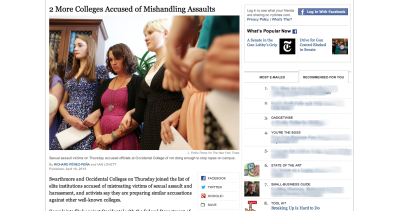An Easy Solution to the Innocence Problem
 College Judicial Consultants I wrote a piece about the problem with proving your innocence in college judicial hearings—quite simply, if you’re innocent it is very hard to be found not responsible with the preponderance of evidence standard.
College Judicial Consultants I wrote a piece about the problem with proving your innocence in college judicial hearings—quite simply, if you’re innocent it is very hard to be found not responsible with the preponderance of evidence standard.
I’ve recently worked with another completely innocent client, and the same problems are there. She was accused of doing something that she not only had no idea how it happened, but for which she also had evidence-supported reasons for believing didn’t happen. I won’t talk about the details, but an analogous case would be if she were accused of arson. A house burned down because the stove was left on, and she lives alone and had nobody over. When she left the house, she turned off the stove, took a picture of it being off with a time and date stamp, and then checked it one more time before leaving. While it’s true that the house burned down and the stove being on was the reason, she had no way of knowing that it was on prior to the blaze or how it was on considering what she did.
Disciplinary boards usually use a burden-shifting approach in determining responsibility. The respondent is innocent before the hearing, but once the complainant shows that something happened and that the respondent did it, it is now up to the respondent to prove it didn’t happen or she didn’t do it. This is how it works in court (again with apologies to my law professors,) but in judicial cases it is a much heavier burden than it is in court, and almost impossible for innocent respondents to meet in most circumstances. In criminal court, all the defense has to do is show that there is a “reasonable doubt” that the defendant didn’t do something. That’s a 5-10% chance. In civil court they have to show that it is 20-30% likely that they didn’t do something. However, in judicial cases the respondent needs to show that they did not do something that happened with more than 50% certainty. Once you show that something happened and that the respondent had either control over that thing or should have had control, the noose is essentially tightened.
 I know that’s confusing, but think of it this way: I show you that a house burned down, that the stove being on was the reason, and that the respondent lives alone. How can she possibly show that she didn’t do it with more than a 50% certainty? She would have to know how it actually did happen and then prove it. What this means is that if the “most likely” explanation for a violation of the conduct code on campus is that the accused person did it, there is essentially no way to prove she didn’t.
I know that’s confusing, but think of it this way: I show you that a house burned down, that the stove being on was the reason, and that the respondent lives alone. How can she possibly show that she didn’t do it with more than a 50% certainty? She would have to know how it actually did happen and then prove it. What this means is that if the “most likely” explanation for a violation of the conduct code on campus is that the accused person did it, there is essentially no way to prove she didn’t.
It gets worse for the innocent student during a judicial hearing.
If you actually didn’t do something and you try to show the disciplinary board that you didn’t do it, that defense can hurt you. If the board thinks that you did it and finds you responsible, it means that they do not accept your version of what happened. Since they don’t accept your version there is a good chance that they think you’re lying, or at least trying to avoid responsibility. Since the disciplinary process is supposed to be “educational,” boards are likely to sanction someone they think responsible and avoiding responsibility harsher than someone who “comes clean” and accepts responsibility. This means that if an innocent student cannot prove that she did not do something, trying to prove it can hurt her more than simply pretending she did it and accepting responsibility even though she is innocent.
The solution to this is simple-retrain the boards. Most respondents are not “innocent” or at least not completely innocent. Some may have mistakenly broken a rule and are being accused of doing it intentionally, but most actually did something wrong that brought them in front of the board. This means that the current way of doing things “works” most of the time. However, if boards are trained to analyze information from the perspective of the accused student many of these false findings of responsibility can be avoided without any impact on the current success of the boards. So if a student can come forward and show that she took reasonable steps to avoid something, that she was unaware of something, or that she actively believed something that would have prevented the violation happened it would no longer be necessary to show what “might” have happened. It is much easier to “prove” what you know to have happened or what you did, than to prove what you had no way of knowing.
Sure there may be some students who escape findings of responsibility, but as the saying goes “It is better that ten guilty persons escape than that one innocent suffer.”
What do you think? How do you weed out “innocent” students or ensure that they don’t face an insurmountable burden? Write a comment or email me at DaveK (at) Collegejudicialconsultants (dot) com.
 board considering the appeal should have no knowledge of the case prior to reviewing the records and materials for the appeal. If there is a relationship, especially a direct reporting relationship, between the two it is impossible to prevent a respondent from thinking that relationship played a part. It is almost as important that a system seem fair as it is that it be fair.
board considering the appeal should have no knowledge of the case prior to reviewing the records and materials for the appeal. If there is a relationship, especially a direct reporting relationship, between the two it is impossible to prevent a respondent from thinking that relationship played a part. It is almost as important that a system seem fair as it is that it be fair.

 puting the impartiality of a board member is and whether or not there was a mistake, but she knows that being suspended for a year is severe. The mistake they make is that in order to win on this ground, the sanction given has to be more severe than the acceptable range for these violations. This does not mean that the appeals officer thinks that the sanction should havebeen lighter, but that the sanction given was not within an acceptable range of potential sanctions. Since most violations that could result in a suspension for a semester could, in theory, result in expulsion this is deceptively difficult.
puting the impartiality of a board member is and whether or not there was a mistake, but she knows that being suspended for a year is severe. The mistake they make is that in order to win on this ground, the sanction given has to be more severe than the acceptable range for these violations. This does not mean that the appeals officer thinks that the sanction should havebeen lighter, but that the sanction given was not within an acceptable range of potential sanctions. Since most violations that could result in a suspension for a semester could, in theory, result in expulsion this is deceptively difficult.


